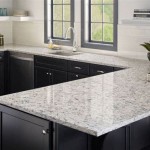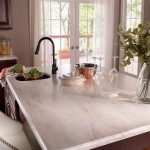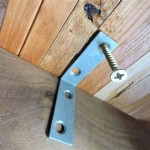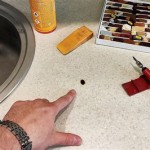How To Remove Stains From Quartz Countertops
Quartz countertops are prized for their durability, aesthetics, and low maintenance. Unlike natural stone, quartz is engineered, a process involving combining crushed quartz with resins and pigments. This manufacturing process results in a non-porous surface that resists staining far more effectively than granite or marble. However, while remarkably resistant, quartz countertops are not entirely impervious to staining, especially from substances like oil, wine, coffee, permanent markers, and certain dyes. Addressing stains promptly and correctly is crucial to preserving the integrity and appearance of the countertop. The methods described herein offer a practical guide to removing various types of stains while minimizing the risk of damage.
Understanding Quartz Material Composition
Quartz countertops are engineered stones, which means they are not purely quartz. Their composition typically consists of approximately 90-95% ground quartz, combined with 5-10% resins, polymers, and pigments. The quartz provides strength and durability, while the resins bind the material together and provide flexibility. The pigments impart color and pattern. This engineered composition is what gives quartz its non-porous nature. A porous surface contains tiny holes that liquids and other substances can penetrate, leading to staining. Because quartz is non-porous, liquids tend to remain on the surface, giving more time for cleanup before a stain sets in. However, this doesn't mean stains cannot occur. Prolonged exposure to staining agents, particularly those that are acidic or contain strong dyes, can eventually lead to discoloration or even etching of the resin components within the quartz material. Furthermore, certain substances may react with the resin, causing a stain to become more difficult to remove over time.
The resins used in quartz manufacturing are susceptible to damage from high heat and harsh chemicals. Therefore, it is imperative to avoid placing hot pans directly on quartz countertops and to refrain from using abrasive cleaners, bleach, or solvents. These practices can dull the surface, cause discoloration, or even permanently damage the resin binder, making the countertop more susceptible to future staining. Routine cleaning with mild soap and water, coupled with prompt attention to spills, is the best preventative measure against staining.
Immediate Action for Fresh Stains
The cornerstone of effective stain removal from quartz countertops is immediate action. As soon as a spill occurs, the first step is to blot the liquid or substance with a clean, dry cloth or paper towel. Rubbing the spill can spread the stain and potentially force it deeper into the surface, making it more difficult to remove. Instead, gently blot the area to absorb as much of the spill as possible. Once the majority of the substance has been removed, rinse the area with warm water. This helps to dilute any remaining residue and prevent it from drying and setting into a stain. Follow the rinsing with a thorough wipe-down using a clean, damp cloth and a mild detergent.
Ordinary dish soap is often sufficient for cleaning up most spills. Avoid using harsh chemicals or abrasive cleaners, as these can damage the finish of the countertop. After washing the area with soap and water, dry it thoroughly with a clean, dry cloth. This prevents water spots and further helps to ensure that no residue remains that could potentially lead to staining. If these initial steps are taken promptly and carefully, many spills can be completely removed before they have a chance to leave a lasting stain.
Methods for Removing Stubborn Stains
Even with prompt attention, some substances can leave behind stubborn stains that require more intensive cleaning methods. Here are several options to consider, progressing from the least abrasive to the most, to minimize the risk of damage to the quartz surface.
1. Mild Dish Soap and Warm Water: This remains the first line of defense. For stubborn stains, create a paste of mild dish soap and warm water. Apply the paste to the stain, let it sit for a few minutes (no more than 10), and then gently scrub the area with a soft cloth or sponge. Rinse thoroughly with warm water and dry with a clean cloth. This method is effective for many common household stains, particularly those caused by food and beverages. The slightly longer contact time allows the soap to penetrate the stain and loosen its grip on the surface.
2. Isopropyl Alcohol: Isopropyl alcohol, commonly known as rubbing alcohol, is an effective solvent for removing many types of stains, including ink, grease, and some dyes. Soak a cotton ball or clean cloth with isopropyl alcohol and gently blot the affected area. Avoid rubbing vigorously, as this can spread the stain. Allow the alcohol to sit on the stain for a few minutes, and then wipe it away with a clean, damp cloth. Rinse the area thoroughly with warm water and dry with a clean cloth. It is important to test the alcohol in an inconspicuous area first to ensure it does not discolor or damage the countertop's finish.
3. Baking Soda Paste: Baking soda is a mild abrasive that can be effective for removing stains without scratching the surface of the quartz. Create a paste by mixing baking soda with a small amount of water until it forms a thick consistency. Apply the paste to the stain and gently rub it in a circular motion with a soft cloth or sponge. Be careful not to apply too much pressure, as excessive scrubbing can still damage the finish. Rinse the area thoroughly with warm water and dry with a clean cloth. Baking soda is particularly effective for removing stains caused by coffee, tea, and other organic materials.
4. Quartz Cleaner: There are commercially available cleaners specifically formulated for quartz countertops. These cleaners are designed to be gentle yet effective at removing stains without damaging the surface. Follow the manufacturer's instructions carefully when using these products. Typically, the cleaner is sprayed onto the stain, allowed to sit for a few minutes, and then wiped away with a clean cloth. Always rinse the area thoroughly with warm water after using a quartz cleaner to remove any residual product.
5. Magic Eraser: Melamine sponges, commonly known as magic erasers, can be effective for removing stubborn stains from quartz countertops. However, they should be used with caution, as they are mildly abrasive and can dull the finish if used excessively. Wet the magic eraser and gently rub the stain in a circular motion. Avoid applying too much pressure. Rinse the area thoroughly with warm water and dry with a clean cloth. It is advisable to test the magic eraser in an inconspicuous area first to ensure it does not damage the countertop's finish. Limit its use to only the most persistent stains.
Preventative Measures to Protect Quartz Countertops
While effective stain removal techniques are essential, the best approach to maintaining the pristine condition of quartz countertops is prevention. Implementing proactive measures can significantly reduce the likelihood of staining and minimize the need for intensive cleaning.
1. Use Cutting Boards and Placemats: Always use cutting boards when preparing food on quartz countertops. This prevents scratches and stains from sharp knives and food particles. Placemats should be used under plates and bowls to protect the surface from spills and heat. These simple precautions can significantly reduce the risk of damage and staining.
2. Clean Spills Immediately: As emphasized earlier, prompt action is crucial when spills occur. The sooner a spill is cleaned up, the less likely it is to result in a stain. Keep a supply of clean cloths and paper towels readily available for quick cleanup. Encourage everyone in the household to be vigilant about wiping up spills as soon as they happen.
3. Avoid Harsh Chemicals and Abrasive Cleaners: Never use harsh chemicals or abrasive cleaners on quartz countertops. These products can damage the finish and make the surface more susceptible to staining. Avoid using bleach, ammonia, oven cleaner, drain cleaner, and scouring pads. Stick to mild soap and water or cleaners specifically formulated for quartz.
4. Protect from High Heat: Quartz countertops are not heatproof. While they can withstand moderate heat, prolonged exposure to high temperatures can cause discoloration or even cracking. Always use pot holders or trivets under hot pots and pans. Avoid placing hot appliances, such as coffee makers or toasters, directly on the countertop.
5. Be Mindful of Staining Agents: Certain substances are more likely to stain quartz countertops than others. Be particularly careful with substances like red wine, coffee, tea, juice, food coloring, permanent markers, and acidic liquids. Clean up these spills immediately and avoid allowing them to sit on the surface for extended periods.
6. Regular Cleaning: Establish a routine of regular cleaning to keep quartz countertops looking their best. Wipe down the surface with mild soap and water daily or after each use. This helps prevent the buildup of dirt, grime, and potential staining agents. For deeper cleaning, use a quartz-specific cleaner or a baking soda paste.
By following these preventative measures and adopting a proactive approach to cleaning, homeowners can significantly extend the lifespan and maintain the beauty of their quartz countertops. While stains can occur, understanding the composition of quartz, acting quickly on spills, and employing appropriate cleaning methods will ensure that the countertops remain a stunning centerpiece of the kitchen or bathroom for years to come.

How To Remove Yellow Stains On Quartz Countertop Kitchen Cabinet

How To Remove Stains From White Quartz Countertop

7 Easy Ways To Remove Common Quartz Countertop Stains Torera George

How To Get Permanent Marker Off Quartz Countertop Safely

7 Easy Ways To Remove Water Stains From Quartz Countertops Torera George

How To Remove Water Stains From Quartz Countertops Rsk Marble Granite

The Easy Guide For How To Clean Quartz Countertops Tidbits Twine

How To Remove Stains From Quartz Countertops Moonlight Stone Works Inc

Are You Cleaning Quartz Countertops Wrong

How To Remove Yellow Stains On Quartz Countertop Kitchen Cabinet
See Also








